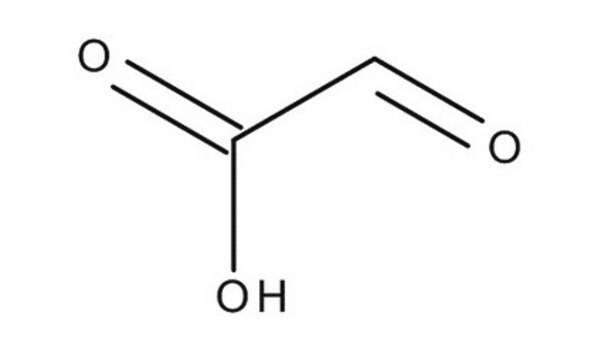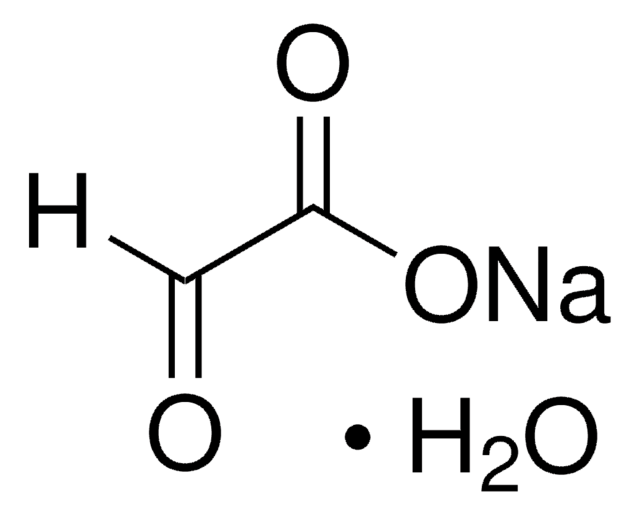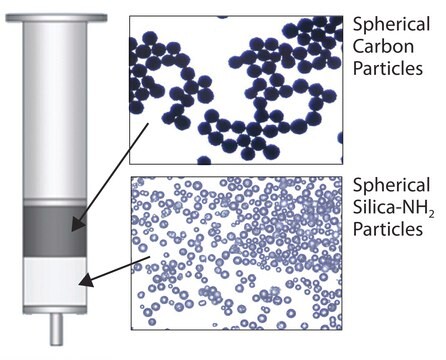8.14084
Glyoxylic acid
(50% solution in water) for synthesis
Synonyme(s) :
Glyoxalic acid
About This Item
Produits recommandés
Pression de vapeur
10 hPa ( 25 °C)
Niveau de qualité
Forme
liquid
Puissance
2528 mg/kg LD50, oral (Rat)
>2000 mg/kg LD50, skin (Rat)
pH
0.3 (19.5 °C in H2O)
Point d'ébullition
111 °C/1013 hPa
Pf
-93 °C
Densité
1.34 g/cm3 at 20 °C
Température de stockage
2-30°C
Application
- Advancing mesoporous carbon synthesis for supercapacitors: Research highlights the use of glyoxylic acid as a cross-linking agent in the synthesis of mesoporous carbons, enhancing their functionality for supercapacitor applications. This study provides key insights into the design of advanced energy storage materials (Song et al., 2023).
- Thermoset films and coatings: Glyoxylic acid is utilized to create ductile, high-lignin-content thermoset films and coatings, showcasing its applicability in sustainable material engineering. This approach offers new opportunities for the development of environmentally friendly coatings and films (Boarino et al., 2023).
- Organic synthesis: A novel decarboxylative N-formylation of amines using glyoxylic acid, promoted by H2O2, has been documented, highlighting its role as a reagent in organic synthesis. This method represents a significant advancement in the synthesis of amine derivatives (Wu et al., 2023).
- Enhancing luminescence in covalent organic frameworks: A study demonstrates the incorporation of glyoxylic acid as a linker in two-dimensional covalent organic frameworks, significantly boosting their luminescence. This finding opens up new avenues for the use of these materials in optoelectronic applications (Yang et al., 2023).
Remarque sur l'analyse
Density (d 20 °C/ 4 °C): 1.330 - 1.340
Mention d'avertissement
Danger
Mentions de danger
Conseils de prudence
Classification des risques
Eye Dam. 1 - Met. Corr. 1 - Skin Corr. 1 - Skin Sens. 1
Code de la classe de stockage
8A - Combustible, corrosive hazardous materials
Classe de danger pour l'eau (WGK)
WGK 1
Point d'éclair (°F)
Not applicable
Point d'éclair (°C)
Not applicable
Certificats d'analyse (COA)
Recherchez un Certificats d'analyse (COA) en saisissant le numéro de lot du produit. Les numéros de lot figurent sur l'étiquette du produit après les mots "Lot" ou "Batch".
Déjà en possession de ce produit ?
Retrouvez la documentation relative aux produits que vous avez récemment achetés dans la Bibliothèque de documents.
Notre équipe de scientifiques dispose d'une expérience dans tous les secteurs de la recherche, notamment en sciences de la vie, science des matériaux, synthèse chimique, chromatographie, analyse et dans de nombreux autres domaines..
Contacter notre Service technique








